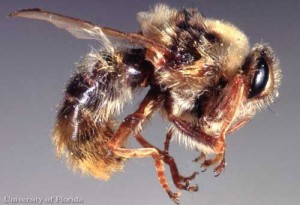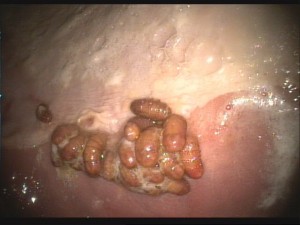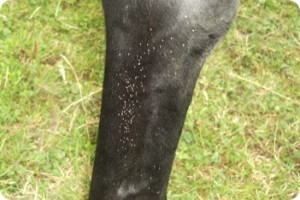Written by Frank M. Andrews, DVM, MS, DACVIM 
LVMA Equine Committee Professor and Director
Equine Health Studies Program
Department of Veterinary Clinical Sciences
School of Veterinary Medicine
Louisiana State University
Original Publish Date April 2014
As we enter into winter months in Louisiana, it’s time to deworm for Bots (Gastrophilus spp.). Bots (larva) are rarely associated with disease, but, as you can see from the photo (Figure 1), they are aesthetically unpleasing as they overwinter in the horse’s stomach and may indicate a larger parasite infestation.
Figure 1. Adult bot fly (http://entnemdept.ufl.edu/creatures/livestock/horse_bot_fly.htm) (Courtesy of the University of Florida IFAS, Morgan McLendon)
Bot larvae overwinter in the horse’s stomach or small intestine. In the spring, when environmental temperatures increase, the bot larvae are passed out in the manure and eventually hatch into honey bee-sized flies (Figure 2). These female flies eventually lay and glue their eggs (or nits) to the legs of horses, donkeys and mules (Figure 3). Once on the legs, the eggs enter into the horse’s mouth when they chew or rub on their legs. In the mouth the eggs hatch out in 2 to 5 days, stimulated by the warm moist environment of the mouth. They spend approximately 3 weeks in the soft tissues of the lips, gums and tongue and then migrate to the stomach and small intestine, where they use sharp mouth hooks to attach to the lining. They spend about 7 months in the stomach before they pass out in a pile of manure. The mature larvae enter the soil between the manure pile and turn into pupae. In 2 week to 2 months these pupae emerge as flies and the life cycle starts all over again.
Figure 2. Bot larva (thick arrow) and Habronemia larva (thin arrow) in the stomach of a horse as viewed by a 3 meter (9 ft) endoscope (Karl Storz Endoscope, Carlsbad, CA) inserted into the horses stomach.
Figure 3. Bot eggs (or nits) on the leg of a horse.
We recommend that you deworm your horse with a boticide once each year during late fall or early winter as a clean-out treatment for bots and other parasites. This will decrease the number of flies in the manure and decrease transmission of bots next spring. Dewormer pastes containing ivermectin or moxidectin have excellent activity against Bots and many other parasites affecting horses. By deworming in the fall or early winter you can improve the overall health of your horse during the winter and decrease the number of parasites that might contaminate your pastures next spring. As with all medications that you give to your horse, please check with your veterinarian for the best dewormer and deworming program for your horses.





